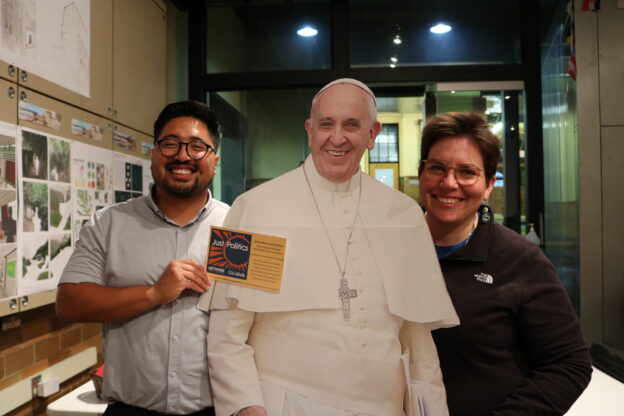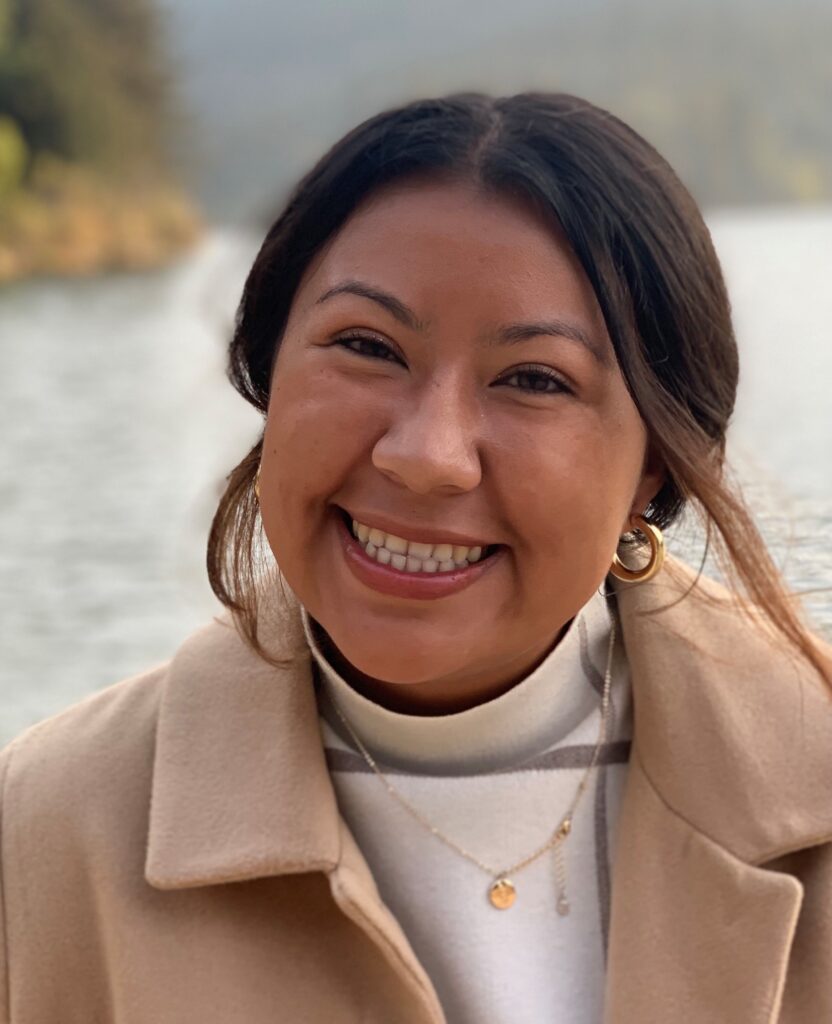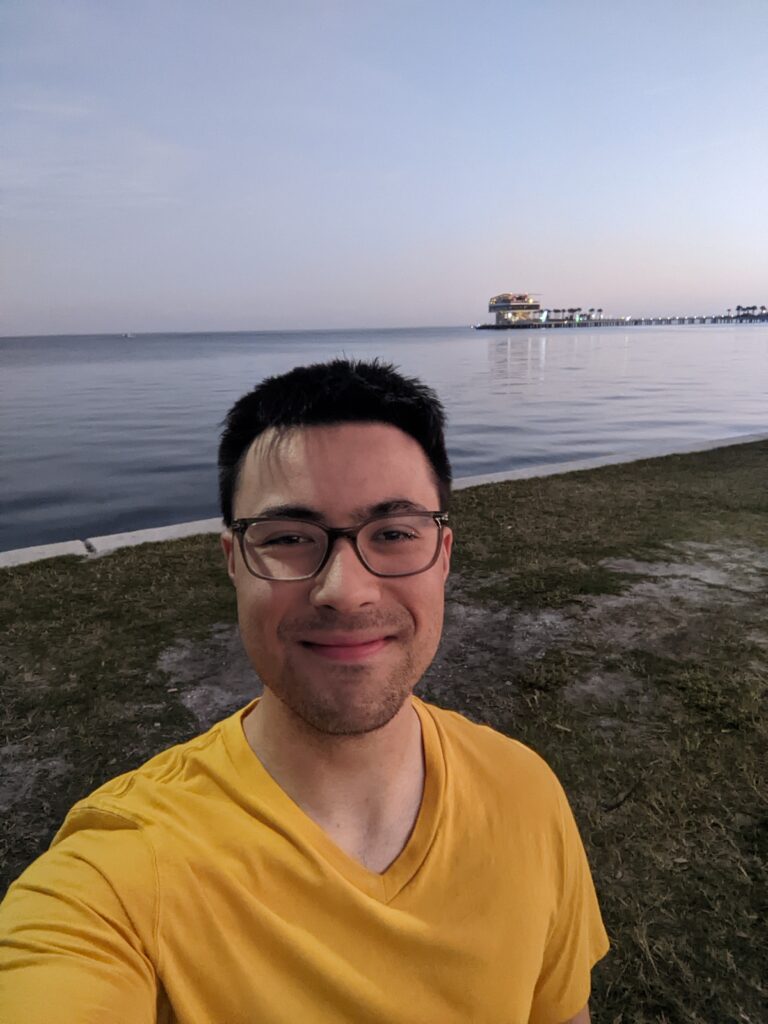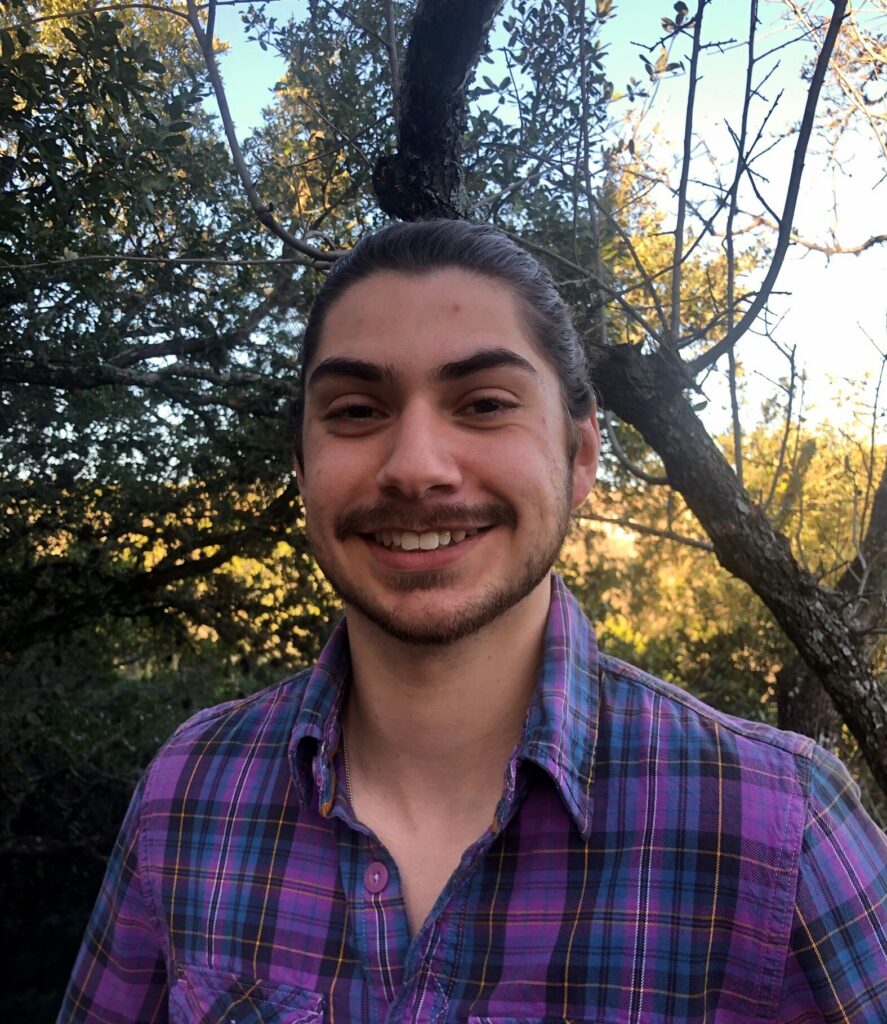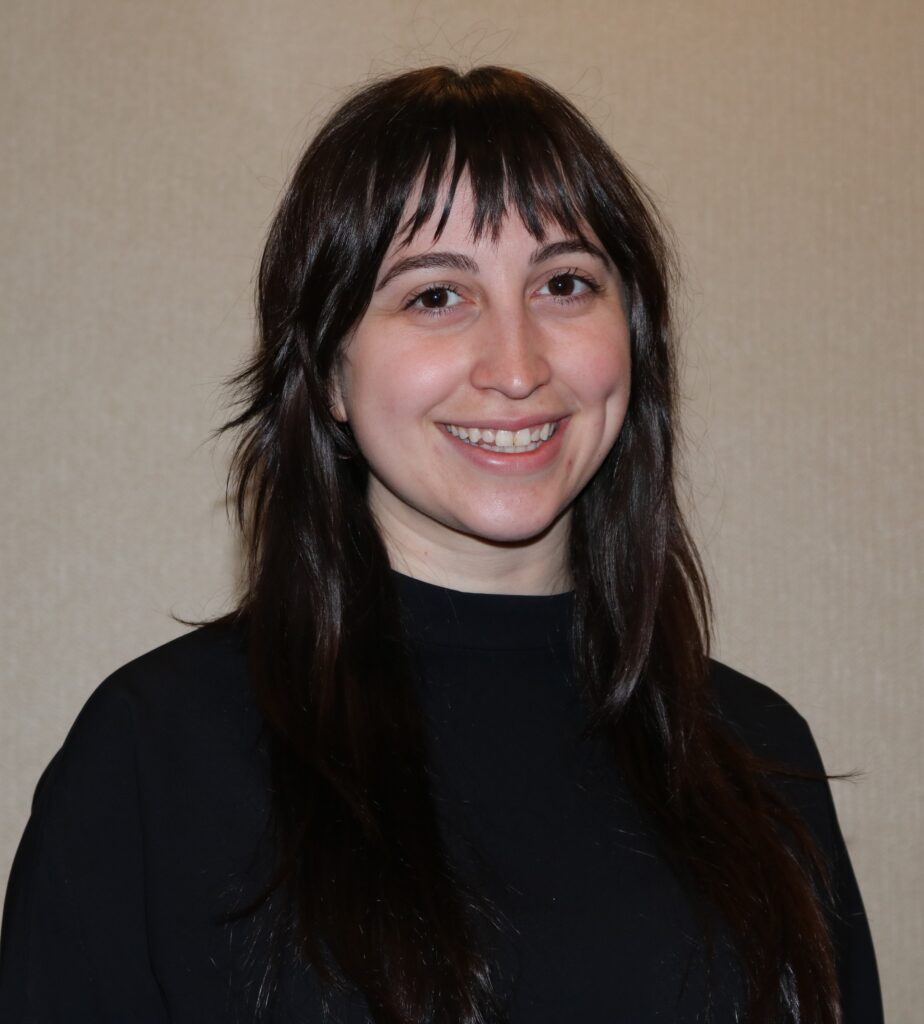
Gen Z’s Voter Vision
Young Catholics See Connections to Their Faith When They Vote for Justice
Nora Bradbury-Haehl
April 19, 2023
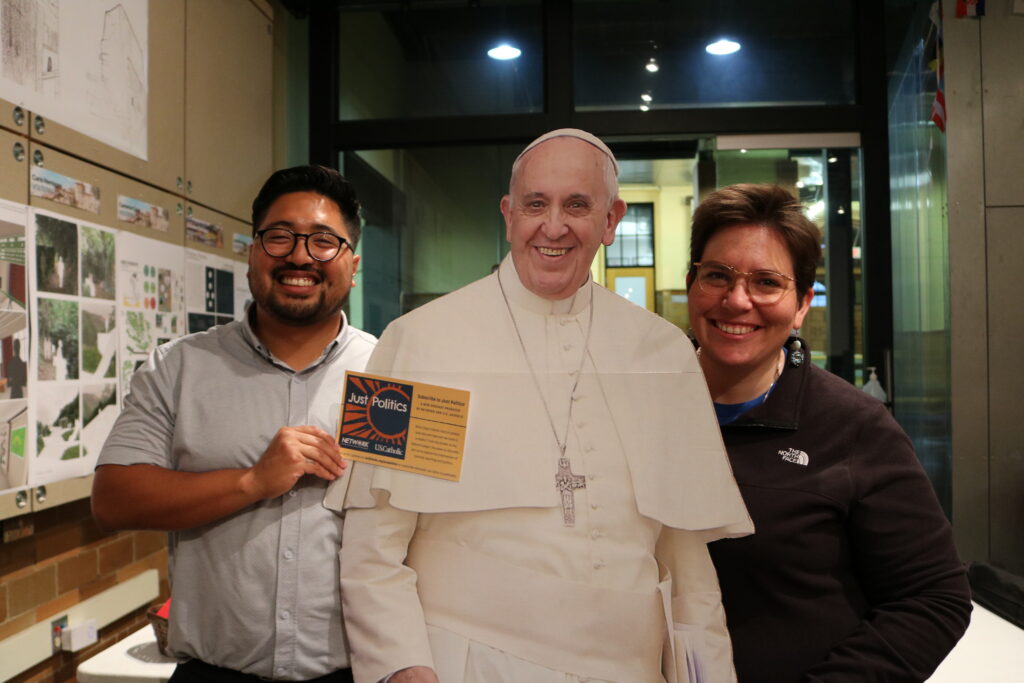
Colin Martinez Longmore and Sr. Eilis McCulloh, HM, of the NETWORK Grassroots Mobilization Team and co-hosts of the Just Politics podcast, stand with a cutout of Pope Francis at University of Detroit Mercy on Oct. 12, 2022, on NETWORK’s Pope Francis Voter Tour.
On Nov. 9, 2022, the day after the midterm elections, President Joe Biden expressed his gratitude to young voters. “I especially want to thank the young people of this nation, who voted in historic numbers,” he said, and named the issues they came out for: “They voted to continue addressing the climate crisis, gun violence, their personal rights and freedoms, and student debt relief.”
Gen Z has embraced a platform of social justice — economic, racial, climate, immigration — and they don’t just care about it, they vote about it. In 2018, young people ages 18-29 set a record for voter turnout, 28.2 percent, and again this past fall they came just short of that previous performance at 27 percent. Indeed, Gen Z voters, the largest and most diverse generation of American voters in history, are making waves — and stopping them. The much-hyped “Red Wave” of Republican victories in 2022 never came ashore. The nation’s youngest voters made sure of it.
The Second Vatican Council’s Constitution on the Church in the Modern World (Gaudium et Spes) urges that “all citizens be mindful of their simultaneous right and duty to vote freely in the interest of advancing the common good.” The Venn diagram of Catholic Social Teaching and the values of Gen Z voters has a wide region of overlap.
But do Gen Z Catholics know it?
Seeing Connection
According to Colin Martinez Longmore, they do. Martinez Longmore is the Grassroots Outreach and Education Coordinator at NETWORK, where he works on equipping young justice-seekers with faith-based advocacy skills and opportunities. A co-host of NETWORK’s “Just Politics” podcast, produced in collaboration with U.S. Catholic magazine, Martinez Longmore spent several weeks in the fall of 2022 visiting college campuses and other venues as part of NETWORK’s Pope Francis Voter Tour, making the case for multi-issue voting across generational lines.
Gen Z voters, one of the most racially and ethnically diverse generations, “are also growing up surrounded by an American popular culture that is much more accepting of diversity than before,” says Martinez Longmore. He contends that because of this, their understanding of the equity and social justice aspects of Catholic Social Teaching is more innate than previous generations.
Emely Hernandez, a 24-year-old studying and working in Chicago, also makes the connection between the church’s social teaching and her own vote.
“There is so much beauty and thoughtfulness in the teachings of the Catholic Church that focuses on upholding the dignity and respect for every human,” she says, naming the call to family, community, and participation as the principle that motivates both her vote and her career. She describes the latter as “focused on advocacy work against human injustices” and “working to promote the greater good for those who are poor and vulnerable.” Her current position involves supporting unhoused individuals, low-income families, immigrants, and refugees.
Ethan Carrino is a Michigan-based college student and a recent convert. He describes a “disconnect” he encounters with some older church leaders over hot-button and social issues.
“As a mixed-race Catholic who’s felt racism in the church, raising awareness ending bias, and having inclusion is very important.” Carrino grew up going to Catholic schools but came into the church through a campus RCIA program.
“Our church calls all cultures/ethnicities to itself,” he points out. Regarding voting, Carrino says his faith pushes him to take note of things Jesus would speak on and think about what the Gospel calls him to do.
“It’s easy sometimes to only see an issue a certain way, but being Catholic helps me to see how the issue impacts everyone, especially those in need,” he says.
According to Tuft University’s Center for Information and Research on Civic Learning and Engagement (CIRCLE), a non-partisan, independent research organization focused on youth civic engagement in the United States, “Youth are increasing their electoral participation, leading movements, and making their voices heard on key issues that affect their communities.” The first Gen Z member of Congress, 25-year-old Maxwell Frost, got his start organizing with the anti-gun-violence group March for Our Lives. Voters of Tomorrow, a pro-democracy research and advocacy organization, was founded in 2019 by then 17-year-old Santiago Mayer.
What is Meant by Catholic?
Do Gen Z Catholics see a connection between the church’s teachings and their vote? Christian Soenen, projects manager of the Initiative on Catholic Social Thought and Public Life at Georgetown University and one of NETWORK’s 2022 Social Poets, says perhaps.
“I think this largely depends on which circles of Gen Z Catholics I am in,” Soenen says. He observes that very devout Catholics on both the left and the right connect their Catholic identity with their vote but that different aspects of religiosity inform their different conclusions on politics.
“Among my friends on the right, ritual, symbol, and personal discipline are components of their practice of faith that then create a cultural lens through which to understand politics” Soenen says, which in his observations translates to conservatism. On the left, “the social message of the Gospels and the prophets form the core of their understanding of their faith.”
Among left-leaning young Catholics, this understanding manifests as a desire for a more inclusive and equitable society that prioritizes issues like poverty and healthcare.
Audrey Carroll, 24, is a political communications professional and former NETWORK staff member. She says her faith provides a framework for the values she cares about and votes for, “by encouraging me to always be in pursuit of justice and the common good.” Carroll says being Catholic teaches her to avoid supporting “policies and legislation that only protect and benefit people with power and privilege” and to reject policies that “intentionally marginalize underserved communities and individuals.”
Nick Cook, 24, works in Rochester, New York at a refugee outreach center. He has worked with homeless veterans and, during college, volunteered with a Catholic organization that serves the people living in poverty in rural Pennsylvania. Cook says he votes the way he does because of his Catholic faith and Catholic Social Teaching. The issues that he identifies as a part of that influence also have wide appeal among his peers: “Respect for all God’s creation — environment, option for the poor and dignity of the human person — higher minimum wage, more expansive public benefits, care for refugees, the homeless, anti-death penalty, anti-gun.”
But he also identifies two big sticking points: “I disagree with a narrative I hear that Catholic voting should lead to voting for anti-abortion candidates without regard for any other issues, especially because I believe conservative candidates have more opinions opposing Catholic social teaching than more liberal candidates.”
His other concern is also common among Gen Z voters: “Thinking about the term ‘Catholicism’ sparks ideas of a lack of openness to issues of sexual orientation and gender identity, even though I and many Catholics I know are open to that. I also believe respect for the gay and transgender community should be included in respecting the dignity of the human person too.”
Where We’re Rooted
Gen Z Catholics, depending on where they worship and what movements or media they are connected to, may or may not hear their own views and values supported by church leaders. Nonetheless, those who are committed to Catholic Social Teaching seem to be firmly rooted.
Martinez Longmore describes his own sense of it: “My Catholic faith instilled instilled in me a deep sense of reverence for the inherent dignity of every person, and an awareness of God’s unique preference for marginalized and shunned communities. So I see issues like creating a just immigration process, or reforming the criminal legal system, or addressing the root causes of poverty through public policy as a very Catholic thing — even if I don’t hear those issues talked about at my local parish or by faith leaders.”
Soenen at Georgetown offers a caveat on the importance of formation: “A Catholic whose faith formation hasn’t included any significant focus on the social dimension of the Gospel will have very little reason to reject the present destructive forces in politics: populist nationalism, nativism, and romanticized notions of the efficacy of capitalism, to name a few. In this case, faith might actually become an obstacle to social justice, especially if it is understood to place morals in a dimension that is somehow separate from the public square.”
But Soenen’s thinking on young Catholics whose faith causes them to care about social justice is that they will have “an extraordinarily impactful dedication to social justice and will carry with them a moral that is more consistent, coherent, and focused on the common good than another system of social values.”
He adds, “When faith and politics are understood together, the faith adds a sense of transcendent importance to the politics, while knowing that that importance is fully expressed in human terms. My Catholicism, for me, means that a political injustice offends both God and humans, and because of that, it has a much stronger hold over my conscience than it would have if the religious component were absent.”
Nora Bradbury-Haehl is the author of “The Twentysomething Handbook” and “The Freshman Survival Guide.”







